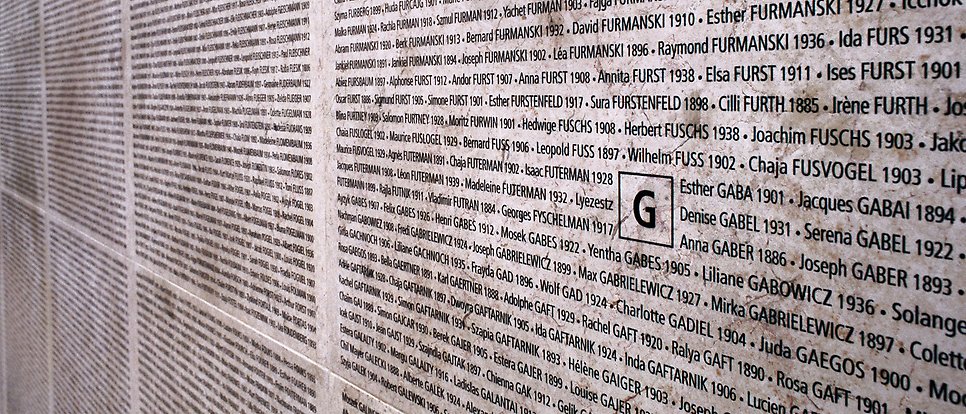Master's Programme in Holocaust and Genocide Studies
120 credits

Have you wondered what social factors incite instances of genocide and other forms of mass violence? Holocaust and Genocide Studies is a dynamic field of research and education of the highest international relevance. The Master's Programme in Holocaust and Genocide Studies will give you the ability to independently understand and analyse the phenomenon of genocide and other forms of mass violence in their historical and cultural contexts.
Autumn 2023 Autumn 2023, Uppsala, 100%, On-campus, English
- Location
- Uppsala
- Pace of study
- 100%
- Teaching form
- On-campus
- Instructional time
- Daytime
- Start date
- 28 August 2023
- Language of instruction
- English
- Entry requirements
-
Academic requirements
A Bachelor's degree, equivalent to a Swedish Kandidatexamen, from an internationally recognised university. The main field of study must be within the humanities or social sciences.
Language requirements
Proficiency in English equivalent to the Swedish upper secondary course English 6. This requirement can be met either by achieving the required score on an internationally recognised test, or by previous upper secondary or university studies in some countries. Detailed instructions on how to provide evidence of your English proficiency are available at universityadmissions.se.
- Selection
-
Students are selected based on an overall appraisal of previous university studies and a statement of purpose.
Tuition fee-paying students and non-paying students are admitted on the same grounds but in different selection groups.
- Fees
-
If you are not a citizen of a European Union (EU) or European Economic Area (EEA) country, or Switzerland, you are required to pay application and tuition fees.
- Application fee: SEK 900
- First tuition fee instalment: SEK 50,000
- Total tuition fee: SEK 200,000
- Application deadline
- 16 January 2023
- Application code
- UU-M5075
- Additional information
-
In addition to the general supporting documents, you also need to submit a programme-specific application summary sheet Pdf, 183 kB..
Check the application guide for information on how to apply and what other supporting documents you need to submit.
Autumn 2024 Autumn 2024, Uppsala, 100%, On-campus, English
- Location
- Uppsala
- Pace of study
- 100%
- Teaching form
- On-campus
- Instructional time
- Daytime
- Start date
- 2 September 2024
- Language of instruction
- English
- Entry requirements
-
Academic requirements
A Bachelor's degree, equivalent to a Swedish Kandidatexamen, from an internationally recognised university. The main field of study must be within the humanities or social sciences.
Language requirements
Proficiency in English equivalent to the Swedish upper secondary course English 6. This requirement can be met either by achieving the required score on an internationally recognised test, or by previous upper secondary or university studies in some countries. Detailed instructions on how to provide evidence of your English proficiency are available at universityadmissions.se.
- Selection
-
Students are selected based on an overall appraisal of previous university studies and a statement of purpose.
Tuition fee-paying students and non-paying students are admitted on the same grounds but in different selection groups.
- Fees
-
If you are not a citizen of a European Union (EU) or European Economic Area (EEA) country, or Switzerland, you are required to pay application and tuition fees.
- Application fee: SEK 900
- First tuition fee instalment: SEK 50,000
- Total tuition fee: SEK 200,000
- Application deadline
- 15 January 2024
- Application code
- UU-M5075
- Additional information
-
In addition to the general supporting documents, you also need to submit a programme-specific application summary sheet Pdf, 183 kB..
Check the application guide for information on how to apply and what other supporting documents you need to submit.
About the programme
The history and memory of the Holocaust are central to this field of study, but you will also study other episodes of genocide, genocidal violence and other forms of mass violence and their historical, political and cultural contexts.
These violent events have usually occurred in conjunction with major economic, social and political crises, mobilisation of ethnic identities, formation of new states, colonial processes and modernisation. While studying different cases of genocide and mass violence closely, you will also learn methodologies and analytical perspectives from various disciplines.
The Master's Programme in Holocaust and Genocide Studies at Uppsala University is a cross-disciplinary course of study drawing from academic fields such as history, political science, cultural and social anthropology, international law, sociology, peace and conflict studies, psychology and history of ideas
During the programme, you can expect to
- independently and critically identify and analyse problems that are of central importance to the field of Holocaust and genocide studies
- learn methodologies and analytical perspectives from various disciplines
- gain empirical knowledge and sharpened analytical abilities that are sought-after skills for a variety of potential employers.
Student profile
You have a Bachelor's degree in the humanities or social sciences and the Bachelor's thesis you wrote gave you experience in the appropriate identification and use of theories and methods. You are motivated and willing to take a lot of responsibility in forming your own educational experience. Ideally, you already have a fairly clear idea about what subject you want to base your Master's thesis on.
Your social skills are good and you are both able and willing to communicate your ideas and thoughts in written and spoken English. You also understand that studying the Holocaust and episodes of genocide can be a very emotional experience and that honesty about your feelings and respect for the feelings of others is important.
Degree
The programme leads to the degree of Master of Arts (120 credits) with Holocaust and Genocide Studies as the main field of study. After one year of study, it is possible to obtain a degree of Master of Arts (60 credits).
Content
The Master's Programme in Holocaust and Genocide Studies is a two-year programme (120 credits). However, it is possible to finish after one year with 60 credits. You will write a Master's thesis worth 45 credits (or 15 credits if you choose to finish after one year). You will also have the possibility of combining your studies with methodology courses and courses at other departments.
During the first semester, you will study compulsory courses in Holocaust history and other episodes of genocide and mass violence from cross-disciplinary perspectives. Other case studies you will analyse include Armenia, Cambodia, Rwanda and Bosnia-Herzegovina. Episodes of genocidal violence that have occurred in Latin and North America, Africa and Asia will also be studied. You will learn about the historical, political and cultural processes and contexts in which mass violence has occurred, including fascism, colonialism, and communism.
The second semester will begin with a compulsory course on theories of genocide and mass violence, followed by the opportunity to choose from different courses covering specific aspects of mass violence, including psychology, social psychology, cultural and social anthropology, peace and conflict studies, international law and the study of (historical) memory.
You will also have the opportunity to take relevant courses from other departments within the Faculties of Arts and Social Sciences.
During the third semester, you will choose a specific method for your thesis, take a methodology course, and begin drafting your Master's thesis.
The fourth semester is devoted to writing and defending your Master's thesis.
Courses within the programme
For courses within the programme, see the programme outline.
Learning experience
Instruction will take the form of lectures, seminars, independent group work, and individual and group tutorials.
All course instructors are highly qualified in their fields and have been published internationally and in Sweden. This ensures a close connection between ongoing research and education. Your active participation in all phases of the Master's programme is compulsory. Grading will be based on active participation in seminars, written assignments and other written and oral examinations. You will also be graded on your completed thesis, including defending your thesis orally and leading a discussion of another student's thesis.
The programme is taught in Uppsala. The language of instruction is English.
Career
The programme will provide you with empirical knowledge and theoretical insights based on state-of-the-art research and pedagogy in the field of Holocaust and genocide studies. A variety of international organisations actively seek students equipped with such knowledge and analytical skills. These include:
- UN organisations,
- The European Union,
- The Council of Europe,
- Governmental ministries, including defence and foreign services,
- International NGOs (Human Rights Watch, IDEA),
- Museums and other institutions of commemoration (Forum for Living History).
If you choose to pursue a PhD, this Master's programme will qualify you to apply for doctoral studies in several disciplines, such as history.
Career support
During your time as a student, UU Careers offers support and guidance. You have the opportunity to take part in a variety of activities and events that will prepare you for your future career.
Is this programme right for you?
Read interviews with our students.

Programme video
Watch our video about the programme.

Register your interest
Keep updated about the application process.

Programme syllabus
- Programme syllabus valid from Autumn 2024
- Programme syllabus valid from Autumn 2018
- Programme syllabus valid from Autumn 2015, version 2
- Programme syllabus valid from Autumn 2015, version 1
- Programme syllabus valid from Autumn 2014
- Programme syllabus valid from Autumn 2013
- Programme syllabus valid from Spring 2011
Contact
- For programme-specific information, please contact Director of Studies Jonas Lindström:
- studierektor-ma-hist@uu.se
- + 46 18 471 15 59
- For admissions-related or general information, please contact our applicant support team:
- masterprogrammes@uu.se
Students
As a student you will find information about your studies in the student gateway.
